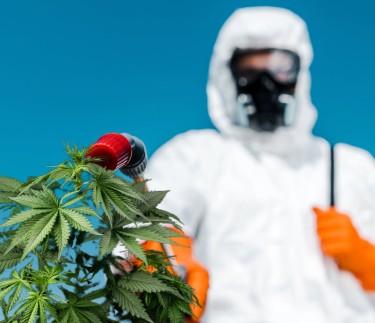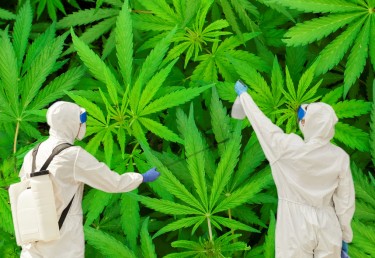
How To Prevent Pests In Your Homegrown Cannabis Plants Without Using Harmful Chemicals
Just like every other plant, cannabis plants will also attract its fair share of pests and bugs when you try to grow them at home. Even professional cannabis growers have to deal with pests!
Pests come in the form of insects, fungus, mites, and bacteria. For homegrown marijuana, the most common offenders include aphids, thrips, spider mites, botrytis, cabbage loopers, whiteflies, powdery mildew, fungus gnats, and root aphids. When they go on undetected or without any treatment, they can cause a wide array of damage to your precious cannabis plant.
The worst-case scenario is that your plant can end up being so unhealthy and damaged, that you might even have to end up throwing it away before you can harvest anything. Sometimes, the pest problem can hide itself so effectively that you won’t even know it’s there until you’ve harvested your weed, and are opening your buds apart to smoke. Then, it would be far too late to do anything!
Many weed growers end up resorting to strong, harmful chemical pesticides and fungicides to prevent pest problems or nip them in the bud. However, these chemical pesticides and fungicides can also be dangerous for humans and the environment. They are, after all, made with chemicals – and some of these chemicals are known to be carcinogenic.
But don’t worry: there are several other ways cannabis home growers can deal with pests without harmful chemicals and strong pesticides.
Prevention Is Key
Truly understanding your home grow setup and operation is the first and most important step to preventing pests. This can take some time and resources in the beginning, but it will save you time and money in the long run!
There are certain factors involved with specific grow setups as well as environments. For example, when growing marijuana outdoors, the most common pests to deal with include aphids, Eurasian hemp borers, corn earworms, and hemp russet mites among others. You’ll also have to learn to prevent squirrels, deer, raccoons, and other bigger animals since humans aren’t the only ones that are attracted to weed!
Meanwhile, there’s a different set of beasts to deal with indoors because other factors are involved. These include humidity, ventilation, and air circulation. But regardless of whether you are growing indoors or outdoors, keep in mind that soil plays a critical role in preventing pests. Many growers have found success in using beneficial nematodes, which are microscopic and thus invisible roundworms that eat pests that thrive in soil. Nematodes are excellent for eliminating root aphids and fungus gnats; you can drench the soil in it or mix it up in water before irrigation.
Companion Planting
Companion planting is a common and widely practiced technique in farming as well as gardening. You can apply the principles of companion planting for cannabis cultivation; it entails planting certain plants or herbs next to cannabis which are known to create a symbiotic or beneficial environment. For example, certain plants or vegetables are known to equally feed off water, while other plants consume more water and thus leave their companion plants thirsty.
Meanwhile, some companion plants are effective in helping repel insects and diseases, which is why they are favored among cannabis growers. When it comes to companion planting, some plants to consider include marigolds, lavender, basil, and nasturtiums.
Beneficial Insects
Believe it or not, some insects can actually be good for your cannabis harvest. Lacewings and ladybugs are two of the most valuable types of insects for cannabis growers, especially if you are growing outside.
To ensure an abundant population, you can purchase beneficial insects and let them roam free in your greenhouse or grow area. They are fantastic for all kinds of plants, not just marijuana. Ladybugs and lacewings are particularly effective because they feed on spider mites, whiteflies, mealybugs, and other soft-bodied pests as well as larvae.
Organic Pesticides
There are several different kinds of effective organic pesticides and fungicides in the market, too. You can use them as a complement to other pest-prevention techniques that you are already doing. Adding organic pesticides to cannabis crop care and maintenance can help greatly deter pests especially if you find that other techniques are lacking or not working as well.
Organic pesticides come in the form of neem oil, insecticidal soap, and botanical sprays. Neem oil is a top choice when it comes to organic pest control, even among household plants! Keep in mind to use neem oil only during the vegetative growth cycle of marijuana.
Just dilute two teaspoons of neem essential oil into a gallon of water, then spray. Or, you can also buy ready-to-use neem spray. Neem oil can be sprayed directly on the foliage, or you can also drench the soil in neem oil no matter what stage of growth your cannabis plant is in. It’s extremely effective in killing and preventing cannabis pests including leafhoppers, crickets, aphids, mealybugs, and so much more.
If you’re going to end up using foliar sprays, it’s important to buy the best-quality organic, natural sprays that you can afford. That’s because any ingredients used in those sprays are going to end up in the cannabis flower, which means that you’re going to end up smoking it. When it comes to the best time to use foliar spray on cannabis, it’s during the flowering cycle because it can help keep cabbage loopers and other pests off during this phase.
Conclusion
There are many creative ways you can get rid of pests effectively, whether you are growing cannabis indoors or outdoors. Follow these tips to ensure a healthy harvest without compromising your health or that of the environment – there’s no need to use nasty and highly toxic chemical sprays
PESTICIDES ON WEED? YOU BET, READ ON..
IS ALL WEED TAINTED? 90% OF BLACK MARKET TESTED WEED IS TAINTED!
- SEO Powered Content & PR Distribution. Get Amplified Today.
- PlatoData.Network Vertical Generative Ai. Empower Yourself. Access Here.
- PlatoAiStream. Web3 Intelligence. Knowledge Amplified. Access Here.
- PlatoESG. Carbon, CleanTech, Energy, Environment, Solar, Waste Management. Access Here.
- PlatoHealth. Biotech and Clinical Trials Intelligence. Access Here.
- Source: http://cannabis.net/blog/how-to/just-say-no-to-pesticides-on-your-weed-how-to-grow-bugfree-cannabis-plants-without-using-pestic




